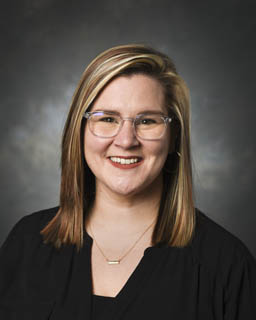Smoke School Staff

Meridyth Lanza is an education program associate with Penn State Facilities Engineering Institute (PSFEI). She assists with the delivery of PSFEI adult, non-credit facilities management courses for Commonwealth of PA, federal government, and non-profit contract clients. In collaboration with the Education Program team and internal and external instructors, Lanza manages registration, student information, course materials, attendance, and certificate issuance through Penn State Conferences and Institutes, Cvent, and PSFEI’s Course Administration System. She also provides administrative support for the annual report process, managing part-time and student hires, and other administrative duties as assigned. Lanza joined PSFEI in July 2017 as an administrative support assistant. Prior to joining PSFEI, she was employed as an operations manager for Spinnaker Multimedia Solutions, an audio engineering firm, in Malvern, Pa. Lanza holds a Bachelor of Arts in music from the University of Valley Forge.
Training Program Instructors

John M. Cimbala, Ph.D., professor of mechanical engineering at Penn State, has taught both graduate and undergraduate courses in fluid mechanics, thermodynamics, heat transfer, instrumentation, and air pollution control. He created the Undergraduate Fluid Flow Laboratory in 1986 and has been a leader in using the internet for teaching enhancement. Dr. Cimbala is the recipient of several teaching and advising awards, including the College of Engineering Premier Teaching Award and the University-wide George W. Atherton Award for Excellence in Teaching. Dr. Cimbala conducts research in fluid mechanics, both experimental and computational, and is the author or co-author of dozens of abstracts and papers that have been published in technical journals. His recent research emphases include turbomachinery, room ventilation, nuclear reactor cooling, heat pipes, and chilled water units. Dr. Cimbala and Dr. Robert J. Heinsohn are co-authors of the textbook, Indoor Air Quality Engineering, Marcel Dekker, 2003. Dr. Cimbala is also co-author of a popular undergraduate fluid dynamics textbook, Fluid Mechanics Fundamentals and Applications, Ed. 3, McGraw-Hill, 2014.

Mark Kenepp is a systems engineering specialist with the Penn State Facilities Engineering Institute (PSFEI). His responsibilities include day-to-day duties associated with the Visible Emission Training Program (Smoke School). He also supports he Facility Condition Assessment team as needed. Prior to joining PSFEI, Kenepp was employed by Philips Ultrasound and GE Inspection Technologies. He has spent 20 years in ultrasound transducer manufacturing environment for both healthcare and industrial applications. Kenepp holds a Bachelor of Science in industrial engineering and a Master of Manufacturing Management, both from Penn State.

Wayne R. Pauley, Ph.D., PE, a principal research engineer, is affiliated with LeMont Nittany Corporation. His research interests include turbulent flow and flow noise, unsteady aerodynamics, advanced heat transfer, and biomedical flows. He is a consultant to industry and government and has conducted research projects sponsored by DOE, NASA, NSF, ONR, and Sandia National Laboratories. He has taught graduate and undergraduate courses at Penn State and Stanford University in fluid dynamics, aerodynamics, gas dynamics, experimental aerodynamics, thermodynamics, and heat transfer. HE has developed several wind tunnels, flow channels, and gas dynamics test facilities, and quantitative optical measurement techniques for gas and liquid flows and heat transfer. He has published dozens of technical papers.

Thomas Iwinski, M.S., certification instructor, is an instructional designer with the College of Engineering at Penn State University Park. He earned a master’s degree in Instructional Technology and a bachelor’s degree in Communications Media. Tom has over 20 years’ experience designing and developing computer-based training and courseware for corporations and higher education. He co-authored the book, Multimedia Training, Developing Technology-Based Systems, McGraw Hill 1996, and designed and built several technology-based classrooms.


